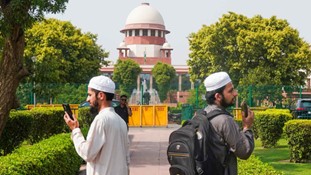Several petitions in the Supreme Court contested the law’s Constitutional validity, claiming it discriminates against Muslims and violates fundamental rights.
New Delhi
The Supreme Court on Monday declined to stay the Waqf Amendment Act, 2025, while granting partial relief by halting the operation of some contentious provisions.
A batch of petitions before the court challenged the law’s Constitutional validity, alleging that it discriminates against Muslims and infringes on fundamental rights. The bench, however, observed that parliamentary laws carry a presumption of validity and can be stayed only in the “rarest of rare” cases.
Among the provisions stayed was the requirement that an individual must have practised Islam for five years before dedicating property to Waqf. The court also suspended the proviso under Section 2(c), which treated certain properties as Waqf by default, and Section 23, which allowed non-Muslims as ex-officio officers, clarifying that “as far as possible” such officers should be from the Muslim community.
It further barred Collectors from unilaterally deciding whether property claimed as Waqf actually belonged to the government, saying such powers would undermine judicial review and citizens’ rights. The bench also directed that the Central Waqf Council not exceed four non-Muslim members, and State Waqf Boards not more than three.
While refusing to stay the clause allowing a non-Muslim CEO, the court said the post should preferably be held by a Muslim.
The petitions were filed soon after the Bill—passed amid heated debate in Parliament—received Presidential assent on April 5, 2025. The Union government defended the law as necessary for curbing alleged misuse of Waqf properties, a stance strongly opposed by senior advocates representing petitioners.
Congress Welcomes SC Order on Waqf Act as Victory for Constitutional Values
The Congress hailed the Supreme Court’s interim order staying several provisions of the Waqf (Amendment) Act, 2025, calling it a “win for justice, equality, and fraternity.” Party leader Jairam Ramesh said the verdict vindicates opposition voices ignored during parliamentary debate and curbs the Act’s “mischievous intentions.” Ramesh said the order protects Waqf properties from dubious challenges and prevents misuse of administrative powers designed to stoke religious disputes.



